
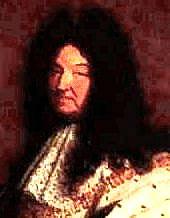 Louis
XIV (the "Sun King") (1643-1715) Louis
XIV (the "Sun King") (1643-1715)
1638-1715.
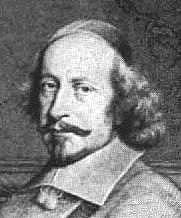 Cardinal
Jules Mazarin (1642-1661) Cardinal
Jules Mazarin (1642-1661)
1602-1661.
 Jean-Baptiste
Colbert (1661-1683) Jean-Baptiste
Colbert (1661-1683)
1619-1683. Controller
general of finance for Louis XIV: originator of an number of economic programs
that made France the leading power of Europe during his time. He
was first brought to prominence as a personal assistant to Mazarin--and
then was commended to Louis by a dying Mazarin as the rightful man to supervise
the king's finances. He ended the system of tax farming and replaced
it with a system by which taxes were collected by salaried tribunals of
the state. He corrected the abuses of the taille, by which some powerful
individuals managed to escape taxation. He lowered taxes, but insisted
on full payment by all.
Being of a
merchant family he had a natural interest in business and industry and
used state resources to encourage the development of French industry and
commerce--such as in the building of new roads and canals.
Serving also
as the Secretary of the Navy, he built up the French Navy as protection
for expanded French mercantilism across the Atlantic and in the Mediterranean.
He also encouraged French immigration into the colonies of New France in
Canada.
Though himself
a Catholic, he acted to protect the Protestants, who were very active in
French industry and commerce.
Louis
XV (1715-1774)
1710-1774.
Only 5 years old when his great grandfather
Louis XIV died, and being the heir apparent, a Regency was established
for Louis XV: first (1715-1723) under a cousin, Philippe d’Orléans,
then (1723-1726) under the incompetent Duke of Bourbon. Also from
an early age Louis came under the personal tutoring of Cardinal Fleury.
The financial state of the French
Royal treasury was a critical trouble-spot during the entire reign of Louis
XV. Cardinal Fleury, who took over from the Duke of Bourbon in 1726,
attempted to continue the frugal economic policies of Colbert. But with
Fleury's death in 1743, Louis decided that he would try to rule on his
own. Sadly however, Louis was a person of relatively weak will and
was easily influenced in his policies by some of his strong-willed mistresses,
notably Madame de Pompadour (after 1745) and Madame du Barry after the
death of Mme de Pompadour in 1764 . Such counsel served only to detach
the king from the practical political and economic realities facing France.
The expenses of trying to maintain
the courtly reign established under Louis XIV--and even more the cost of
Louis XV's own diplomatic and military ventures created a constant drain
on the royal treasury. The War of Austrian Succession (1740-1748)
which drew France into an expensive military contest with other European
powers resulted in a "victory" for the French side--but no tangible benefits.
It also came at a huge cost to the French royal treasury.
Eight years later Louis was back
in war again (with the urging of Mme de Pompadour): the Seven Years War
(1756-1763), aimed principally against France's arch-enemy nation, Great
Britain. The result of the war was the loss for France of most of
its colonial holdings in America, most of its position in Asia, and the
rise of Britain as the unchallenged master of the seas.
At home these disasters only served
to make the opponents of the royal prerogatives all the more biting in
their attacks. Indeed in 1757 Louis was attacked by knife by a would-be
assassin--only driving Louis further away from his critics.
Meanwhile the critical voices of
the French philosophers of the Enlightenment grew all the more determined
in the voicing of their opposition to the king's refusal to place the monarchy
under constitutional restraints and his determination instead to hold all
the more to the absolutist policies of Louis XIV. At first supportive
of the Enlightenment, in time Louis became increasingly reactive to the
views of the major Enlightenment philosophers. This too served to
cut himself off all the more from the strong ideological trends sweeping
France (and Western Europe for that matter) toward the end of his regime.
In the end, Louis understood the
nature of the crisis growing up in France--exclaiming: "after me,
the deluge." He suspected that some kind of horrible accounting for
the French monarchy was fast moving in on the French political scene.
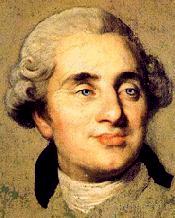 Louis
XVI (1774-1792) Louis
XVI (1774-1792)
1754-1793. Grandson of Louis XV.
At age 16, four years before his
coming to the throne, Louis married Marie Antoinette, daughter of Maria
Theresa and sister of Joseph II of Austria. Marie Antoinette would
prove to be an endless source of poor counsel--a catastrophe for a person
of such weak personal will as Louis XVI.
It was during his reign that the
miserable state of royal finances were made even worse. Chiefly responsible
for this was the French involvement in the American Revolution or War of
Independence. Louis had no particular love of American liberties,
but saw an opportunity in supporting the American rebellion of inflicting
a demoralizing wound on France's long-standing enemy England. He
thus threw French resources into the conflict--which, with the final success
of American independence indeed proved to be something of a diplomatic
victory for France. But it proved also to be an enormous drain on
what little was left of the royal treasury. Further, apart from the
opportunity to humiliate England, France herself gained no real benefits
for her troubles. In short, French involvement in the war of American
independence, though of great benefit to the English colonies in North
America, nonetheless was a disaster for France.
 Louis
sought help from a number of economic counselors, most notably Turgot (1774-1776)
and Necker (1776-1781) to remedy the deteriorating situation of French
royal finances. But with the death of Necker his wife intervened
more and more in the affairs of state to urge Louis to hold fast on the
issue of the absolute power of the monarch--and indeed to head off
any real reforms. Thus the situation grew from disastrous to unbelievably
catastrophic. Louis
sought help from a number of economic counselors, most notably Turgot (1774-1776)
and Necker (1776-1781) to remedy the deteriorating situation of French
royal finances. But with the death of Necker his wife intervened
more and more in the affairs of state to urge Louis to hold fast on the
issue of the absolute power of the monarch--and indeed to head off
any real reforms. Thus the situation grew from disastrous to unbelievably
catastrophic.
The result was that Louis was going
to have to do what his ancestors had refused to do: call a meeting
of the French Estates-General to vote the French monarchy new tax sources.
This was a dangerous thing to do--for the country was screaming for the
king to hear its many grievances. Calling the Estates-General would
afford his opposition a platform from which they could more easily maneuver
against him.
His indecisive nature in the face
of opposition only made a tense situation all the more unmanageable.
He called the Estates-General into session in May of 1789, then he tried
to shut it down. Then he sent troops after the members of the Third
Estate (representing middle class interests) to prevent it from meeting
elsewhere. Rumors of this and that started circulating through a
tense Paris--at one point in July prompting a mob to move on the Bastille
to free the political prisonsers supposedly being imprisoned there (actually
there were none). While soldiers no longer loyal to the king looked
on, the mob tore the Bastille apart. The king no longer commanded
Paris. The French Revolution was underway.
At first the Revolution had more
the appearance of a thorough-going reform movment--and Louis' position
seemed fairly secure. Then in October rumors spread that Louis had
been maneuvering a counter-move of his own against the revolution--and
a Paris mob marched out to his palace at Versailles to bring him back to
Paris. But he was still quite popular with the French. And
he swore to uphold the new French constitution which was then in process
of being written.
Foolishly he attempted to flee France
in disguise in June of 1791, was spotted and brought back to Paris.
Suspicions were that he was conspiring with foreign powers (Austria?) to
undo the Revolution. Nonetheless, his popularity, though tarnished
by the incident, seemed still intact at this point. And in September
he took the oath as a constitutional King of the French.
But on the sidelines he was becoming
the symbolic trophy in a contest between various factions that were trying
to control the direction of the Revolution. The radicals wanted an
end to the monarchy, period. And they proposed to get it by goading
Louis into some kind of treasonous act. They forced him to declare
war on Austria--which did not go well for the French. French humiliation
was then easily directed against the king by the radicals in an effort
to pin the blame for failure on Louis and his lack of enthusiasm for the
war. The mobs were thus easily worked up against the king and
his Austrian wife.
On a couple of occasions in 1792
the mobs stormed the Tuilleries where the royal family was living, threatening
the King and Queen--finally in August seizing the royal family, imprisoning
them in the Temple and suspending the institution of royalty itself, pending
a final decision of the new national Convention called to determine the
political future of the country. In September the radicals won the
decision of the Convention to terminate the monarchy altogether.
In December Louis was brought before the Convention and found guilty of
treason against the French nation. On January 21, 1793 he was executed
at the Place de la Révolution (Place de la Concorde).
Georges
Jacques Danton ( -1794)
1759-1794.
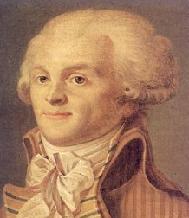 Robespierre
( - 1794) Robespierre
( - 1794)
Maximilen François
Marie Isidore de Robespierre.
1758-1794.
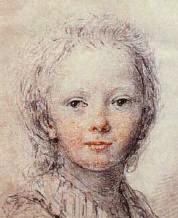 Louis
XVII Louis
XVII
Louis Charles1785-1795?
Louis was the second son of Louis
XVI and Marie Antoinette, given the title of Duke of Normandy. He
was only four years (1789) old when his older brother died and he thus
became the Dauphin of France (heir to the throne). This was also
the year when the French Revolution broke out.
In 1792 he was arrested with all
the royal family and placed in a tower in the Temple prison. When
his father was executed in January of 1793 Louis, not quite seven, became
(in the eyes of the royalists) the Bourbon claimant to the French throne
as Louis XVII--not a position to be particularly envied in revolutionary
France.
The stories that were told of the
whereabouts and the condition of Louis after that are hard to verifty.
Supposedly in the summer of 1793 he was turned over to the care of a rough
couple: Simon, a cobbler, and his wife. That fall he was visited
by a member of the revolutionary court who succeeded in getting the boy
to accuse his mother of a number of crimes, evidence to be used against
her in her trial. Early the next year (1794) Louis was placed in
darkened solitary confinement until the mid summer--when he was moved to
more humane quarters. He was visited only occasionally--at one point
in December of that year by a delegation of the Committee of Public Security
to investigate his conditions.
His conditions in fact by the late
spring (1795) were growing bad--but his medical attention was itself subjected
to politics and intrigue (one doctor attending him was very possibly poisoned).
In June of 1795 it was announced
that Louis had died--though there was no way of verifying this. There
are some good grounds to the claim that the person who had died was a deaf-mute
boy who had been substituted for Louis in captivity in the Temple.
A number of royalists claimed that in fact Louis had been secreted out
of captivity in a coffin and was alive and well in their midst.
As late as 1814 a number of royalists
claimed that Louis was indeed alive--but no Louis XVII came forward to
announce himself. Besides it served the interest of Louis'
uncle, who at that point headed up the royalitst party and who was claiming
the French throne as Louis XVIII, to have the matter dropped. | 










 Miles
H. Hodges
Miles
H. Hodges